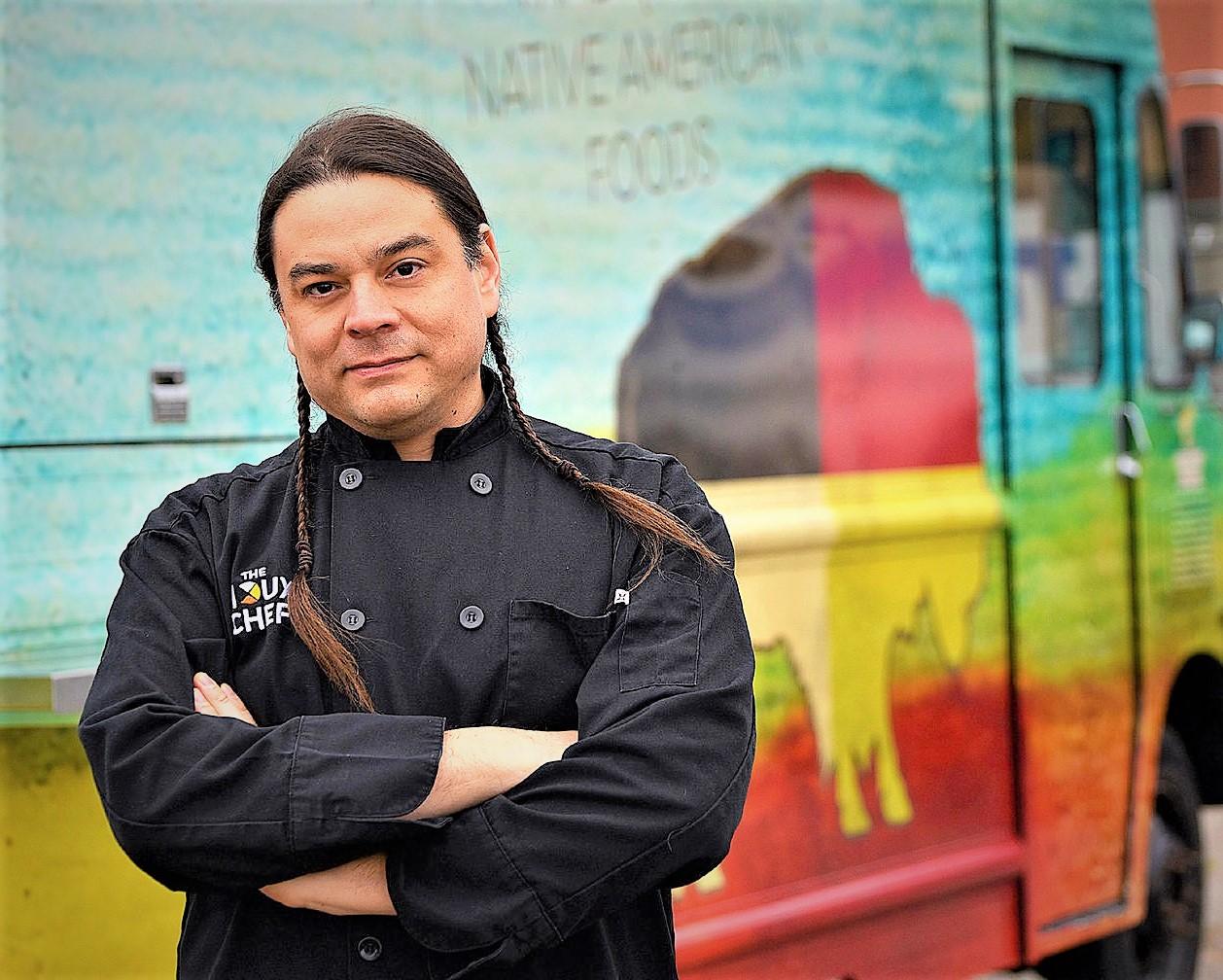Lakota Food Summit to debut

The Sioux Chef, Sean Sherman, Oglala Lakota, born in Pine Ridge, SD, is organizing the food tasting thanks to the Wokini Initiative of SDSU.
RAPID CITY – An impressive lineup of presenters is slated for the first annual Lakota Food Summit taking place February 18th-20th at Holiday Inn Rushmore Plaza. The event is open to the public and is organized by the Lakota Food Sovereignty Council with support from co-sponsor Partnership With Native Americans and several other organizations.
A Lakota Food Summit was brainstormed during the monthly meetings of the Lakota Food Sovereignty Council on the Pine Ridge Reservation several years ago and is finally coming to fruition. The Lakota Food Sovereignty Council was created by the Thunder Valley CDC and the summit has been organized by Dianne Amiotte-Seidel who is the Thunder Valley Food Sovereignty Coordinator. This summit has speakers focusing on the topic of food sovereignty through various lenses such as traditional foods, business management, gardening, and much more. A description on the Summit’s website states “we could not be more excited to have the opportunity to show everyone what food sovereignty means to the Lakota Oyate”
The first day of the Summit, February 18th, is completely free of charge to attend and includes traditional singing and hoop dancing, hands on learning of hand games and star knowledge, and a food tasting from a dozen chefs preparing decolonized dishes with traditional ingredients. All of the featured chefs are from nearby reservations to Rapid City and will be showcasing healthy indigenous foods and flavors while cutting out colonial ingredients.
Sean Sherman, Oglala Lakota, born in Pine Ridge, SD, is organizing the food tasting thanks to the Wokini Initiative of SDSU. Sherman said “The goal here is to understand the ancestral pantry and to evolve the food. We lost a lot of our food knowledge with a history of harsh treatments to tribal communities. And through exploring true flavors of our region we can regain that knowledge while we keep true to the ingredients” As the CEO and founder of Minneapolis based company The Sioux Chef, Sean has received multiple prestigious awards including the 2018 James Beard Award for Best American Cookbook. He will also be giving a presentation and will be available for book signing.
The second and third day of the Summit require a registration fee of $150 for both days. There are discounted prices for seniors, students, and vendors. Registration can be completed on Eventbrite or at the door.
Kelsey Ducheneaux, a keynote speaker from the Intertribal Agriculture Council, is also organizing a poster gathering and leadership event to involve Lakota youth in South Dakota. Ducheneaux described the youth event by saying it “aims to engage our youngest generations of community leaders in an intertribal event. Designed to uplift youth as leaders, this event will present high school students with unique skills and an invaluable network that can inspire food sovereignty within their communities across South Dakota” and that “The Intertribal Ag Council is hopeful that this event will inspire communities to pull tribal leadership attention to the need of promoting regenerative agriculture and food systems throughout Indian Country”
The topic of this year’s poster competition is “what does a future Lakota food sovereign nation look like?” A poster will be presented by teams of students from their respective schools on February 19. Heavy academic research for the creation of posters is welcome, but the Intertribal Ag Council find paramount value in the expertise of the local community elders, and they encourage youth to look to their community for insight on Tribal food sovereignty.
Ducheneaux began with a participation goal of at least one school per reservation, but thus far she has been in contact with over three schools per reservation. Although a team’s physical presence is not required for the competition, the Intertribal Ag Council is offering travel support to offset the costs of transportation and meals.
Alex White Plume is scheduled to speak about hemp in the afternoon of February 20. White Plume, past vice president and president of the Oglala Lakota Sioux Tribe, planted industrial hemp around 20 years ago on the Pine Ridge Reservation. White Plume gained media attention in the early 2000’s due to his crop of industrial hemp being destroyed by the DEA but in 2016 White Plume was able to commercially grow the crop again, and in 2017 he partnered with Evo Hemp, a Colorado based hemp-product producer.
Since around 2010, The Lakota Food Sovereignty Coalition was informally created by partnerships on Pine Ridge and worked on local food production. In 2016 a more formal setting was hosted by the Thunder Valley Community Development Corporation, and stakeholders in the coalition presently include Oglala Lakota College, SDSU Extension & 4-H, the Main Street Project, local entrepreneurs, Native American Natural Foods, and the USDA. Today the coalitions works to increase access to education, research, and development towards sustainable food systems on the Pine Ridge, Rosebud, and Cheyenne-Eagle Butte reservations.
The monthly Lakota Food Sovereignty Coalition meetings are open to the public and take place at various locations across the reservations. The date, time and place of meetings can be found on the coalition’s website and through an email list.
The Coalition is comprised of helpful hands like Leslie Henry from OLC Extension, Dallas and Becky Chief Eagle from All Nations Gathering Center, Matt Wilson from REDCO, Annita Hicks, Rhoda Burrows, Rachel Lindball from the Wokini Initiative, Kari O’Neill, Jason Schoch, Rafael Tapia from Partnership with Native Americans, Trudy Ecoffey, Katie Chustak from Red Cloud Indian School, Steve Hernandez from One Spirit, Patricia Hammon, Inyan Eagle Elk, and Dianne Amiotte-Seidel from Thunder Valley. A majority of the members will be presenting on their various expertise during the breakout or keynote sessions during the Summit.
(Contact Travis Dewes at travisldewes@gmail.com)
